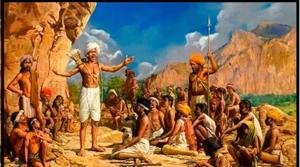In the dense forests of Ulihatu village, now part of Jharkhand, a boy named Birsa Munda was born on November 15, 1875. Little did the world know that this child, born into poverty within the Munda tribe, would grow to become one of India’s most iconic figures in the fight against British colonialism and a beacon of hope for tribal communities.
A Childhood Marked by Struggles
Birsa’s early life was shaped by hardship and resilience. His community faced relentless exploitation under British rule, including the loss of their ancestral lands to landlords and traders. Witnessing the suffering of his people ignited a spark within young Birsa. Although he briefly attended a mission school, his education was cut short due to attempts to convert him to Christianity—an act he resisted fiercely. This experience planted the seeds of his mission: to fight for the rights and dignity of his tribe.
Becoming a Leader
As Birsa grew older, he transformed into a charismatic leader. By the late 1890s, he had rallied his people to resist oppression through the Ulgulan, or “Great Tumult,” movement. This uprising was not just a political rebellion but also a spiritual awakening. Birsa urged his community to reject foreign influences and reconnect with their traditions, creating a unifying faith known as Birsait. His teachings resonated deeply, and he became known as Dharti Aaba, or “Father of the Earth.”
The Ulgulan Movement
The Ulgulan movement sought to reclaim tribal lands and challenge British authority. Under Birsa’s leadership, it gained immense momentum, leading to direct confrontations with colonial forces. Armed with bows, arrows, and unyielding determination, his followers fought valiantly. Despite their courage, the British military’s superior resources overwhelmed the movement.
A Martyr’s Legacy
In 1900, Birsa Munda was captured and died in custody at just 25 years old, reportedly from cholera. Though his life was short, his influence was enduring. His defiance against injustice and his efforts to preserve tribal identity left an indelible mark on Indian history.
Today, Birsa Munda is celebrated as a symbol of resistance and pride. His birth anniversary, observed as Janjatiya Gaurav Diwas, honors his extraordinary contributions to tribal rights and social justice. His story continues to inspire movements advocating for the rights and dignity of marginalized communities across India, reminding us of the power of resilience and unity in the face of oppression



